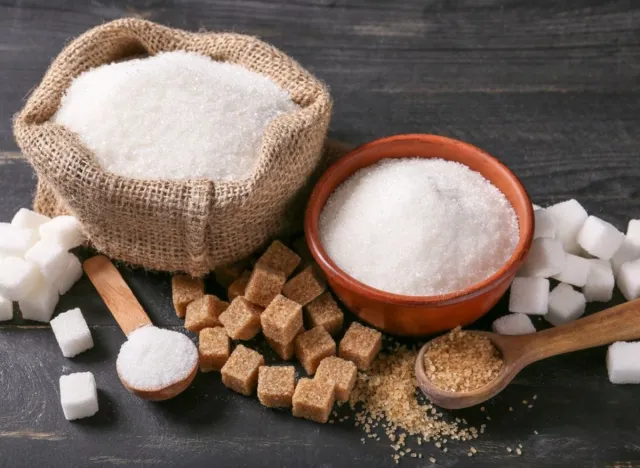The Worst Sweeteners for Abdominal Fat, Say Experts

For those with a sweet tooth, adding some sweeteners to your drinks or food may be a normal part of your everyday diet. They help coffee taste less bitter and food taste less bland. In some cases, it’s harmless. There are even some sweeteners that can help your health. However, in other instances, sweeteners can be dangerous for your body.
You need to watch what kind of sweeteners you use, because some may contain more harmful chemicals than others. Trying to watch your weight? It’s also beneficial to stay away from certain sweeteners that aren’t as natural. If you’re looking to cut back on certain sweeteners that don’t help with your abdominal fat, there are two, in particular, you should stay away from.
Refined sugar

Refined sugar, also known as table sugar, comes from sugar cane or sugar beets, which are processed to extract the sugar.
According to the Cleveland Clinic, table sugar is high in calories and offers no nutritional benefit, which really means you’re just adding it to your diet for taste purposes.
The article continues to mention that many sugary drinks contain about 40 grams of added sugar per serving. Meanwhile, the American Heart Association recommends limiting added sugar to 25 grams per day for women and children over the age of 2. For men, they recommend limiting added sugar to 36 grams per day. These drinks with refined sugars are already maxing out your recommended daily sugar intake.
Ann Taylor, MS, RD, LD, CDCES mentions in the Clinic’s article that the average American eats about 77 grams of sugar per day. This is about three times what the recommendation is for a woman.
“That is equivalent to about 230 calories per day, which could add up to as much as 23 pounds of body fat per year,” she tells the Clinic.
The more unnecessary sugar you consume, the more likely you are to get abdominal fat. With abdominal fat comes a higher risk of becoming obese. The Cleveland Clinic suggests limiting sugar-sweetened beverages to help lower the risk for obesity.
According to the University of Texas MD Anderson Cancer Center, eating too much refined sugar can also lead you to experience sugar spikes. This will eventually contribute to weight gain and other problems like diabetes and heart disease.
High fructose corn syrup
According to Brittany Dunn, MS, RDN, CD, and member of our medical expert board, high fructose corn syrup was initially thought to be a great alternative for diabetics because of its low glycemic index. However, it can only be processed in the liver.
“High fructose corn syrup triggers the production of fat–cholesterol, and triglycerides,” says Dunn. “Some studies show that high fructose corn syrup increases appetite more than traditional added sugar.”
Dunn shares that regular sugar is processed in the intestines and is broken down to glucose. This causes blood sugar to rise. This will release insulin, then leptin. This relays to your brain a sense of fullness.
Because high fructose corn syrup is processed in the liver, these steps are skipped. Therefore, your brain doesn’t receive the same message. There is no feedback to inform you that you’ve consumed enough energy through food.
Another issue with high fructose corn syrup is that it can negatively affect the gut microbiome and lead to a leaky gut.
“This can in turn increase the risk of obesity, inflammation, and insulin resistance,” says Dunn.
If you’re looking for a sweet but healthier alternative, Dunn says naturally occurring fructose, such as what’s found in fruit, does not have the same effect as high fructose corn syrup. Substituting for fruit will also introduce you to fiber and vitamin intake, which are things that can help maintain a healthy weight.